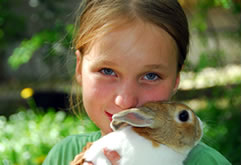 In hard times, pet owners are still shelling out for items like this DogTread motorized treadmill.
In hard times, pet owners are still shelling out for items like this DogTread motorized treadmill.
Despite the shaky economy, dozens of hot new products for pets are hitting the market.
Manufacturers are coming through for all those pet owners who are willing to cut back in other areas rather than deprive their pets, says Bob Vetere, president of the American Pet Products Association.
"Total pet spending has grown at a pace equal to or greater than most other retail segments," says Vetere. He adds that consumers are following the trend toward natural products.
According to the Yellow Pages Association, based in Berkeley Heights, the "pet grooming" listings get the most response from 50- to 64-year-old women with incomes above $60,000. July sees the most frequent usage on grooming. "Our display ads in the pet supplies and food categories peak in August," says Larry Small, director of research.
More than 60 percent of all households (about 71 million in all) own a pet, according to a recent national pet owner survey by American Pet Products. The organization predicts the pet industry will generate sales of $5 billion this year with the top two categories being food ($17.4 billion) and supplies ($10.2 billion).
CHECK OUT THESE PRODUCTS
When we said hot products, here's one that just became available online tomorrow. If you don't want your couch going to the dogs while Scruffy lounges on it, Surefit.com offers a durable and attractive quilted soft suede cover to help keep it clean. How's that for hot?
Prices for the well-constructed covers range from $29.99 to $49.99. In the fall, covers also will be in major stores where the slipcover-maker's full product line is offered.
Remember Stump, the Sussex spaniel who holds the current Best in Show title from Westminster? He's now stumping for a line of products from the Children's Art Project. Launched last month at M.D. Anderson Cancer Center at the University of Texas, "Flag" doggie bandanas were designed by three pediatric patients. Proceeds from the $12 bandanas go directly to pediatric programs at the famed cancer facility.
Joy to the World Collectibles also sells adorable glass dog breed ornaments ($39) to benefit the program. View products online at childrensart.org.
Who doesn't want an easy million? All you need to do is look like your dog. All American Pet Company launched "Bow Wow Million Dollar Contest" to recognize the dog and owner that look the most alike. Submit a photo online no later than July 26 to capture the million or one of the other generous cash prizes. Details at
bowwowmillion.com.
Shop 'til you drop and help homeless animals at the same time through a newly launched website, bringpetshome.org, a nonprofit foundation in Roseland. The site lists 150 major retailers who will allocate a percentage of sales to benefit shelters. Operating costs are absorbed by Schering-Plough Animal Health in Kenilworth.
Sparky losing his spark? How about DogTread's motorized exercise treadmill? You don't want Sparky to reach the point of exhaustion, which means you'll need to watch him throughout his run. This product could be a boon in the dead of winter when a walk outdoors would be unappealing. It comes in three sizes, ranging from $500 to $900. The economy can't be that bad; they were temporarily out of the large size. Go to petzenproducts.com.
If you and your pup like night walks, let some light shine on both of you with HUGlight, a hands-free, flexible light that hangs comfortably from soft foam "arms" around your neck. At $10 to $15, the device generates enough light that you could even read The Star-Ledger at midnight without disturbing anyone. Check mylight.com for details.
Finally, a practical solution for the part of a dog walk owners like least. The name speaks for itself: "Never Touch Shovel Bag." Described as the "civilized way to scoop," packs of bags sell for $2.49 to $8.99, depending on quantity. Visit shovelbag.com.
FURminator.com has a wide range of products, including a terrific line of brushes to snare that extra pet hair and fur before it blankets your furniture.
The site also offers treats that promise to reduce shedding. I can attest that they work. Instead of shedding bushels, my Siberian husky is shedding far less and he loves the treats. Their brushes help, too.
Unquestionably, Up Country offers the most terrific lineup of colorful dog and cat collars, leads and harnesses I've seen, in fabric and leather ranging from $8.50 to $14. Their collections -- about 100 choices -- burst with color and clever designs featuring dog breeds, ducks, fish, Christmas themes, birds, horses . . . you name it. They also carry stylish furniture and healthy treats. Find the products at upcountryinc.com.




 If you're an animal person, the
If you're an animal person, the  onto them. A tortoise that essentially hauled an entire art project on its back.
onto them. A tortoise that essentially hauled an entire art project on its back. Photos by Jill
Photos by Jill
















